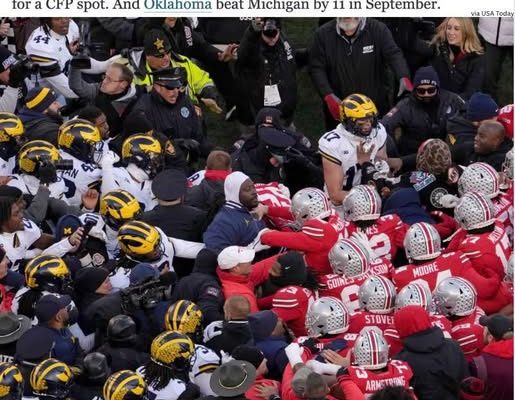If Michigan finishes the rest of the regular season undefeated but then falls to Indiana in the Big Ten Championship, the debate over whether the Wolverines deserve a spot in the College Football Playoff would ignite one of the fiercest controversies in the sport’s modern era. It’s a scenario that perfectly captures the tension between the eye test, the resume, and the principles that the playoff system claims to uphold. On paper, an undefeated Michigan entering the Big Ten title game would be among the nation’s elite, boasting wins over traditional powerhouses and likely holding a top-two or top-three national ranking. Yet a loss to Indiana — a team with little national cachet or historical weight — would throw their entire playoff resume into chaos.
To fully understand the weight of that hypothetical, it’s important to remember how razor-thin the margins have become in college football’s playoff era. For years, the committee has stressed that conference championships matter. “Championships won” is one of their listed criteria for differentiating teams with comparable resumes. But at the same time, the committee has also shown flexibility when dealing with elite teams who stumble late but still look like one of the four best in the country. That’s why this Michigan scenario is so fascinating — it tests the balance between merit and perception, between what’s earned and what’s believed.
If Michigan were to run the table in the regular season, their résumé would already include victories over teams like Ohio State and Penn State — both top-10 opponents in most seasons. Such wins would carry enormous weight, especially given the significance of “The Game” against Ohio State, which annually stands as one of the sport’s defining matchups. Beating the Buckeyes for a third straight time would likely cement Michigan’s claim to Big Ten dominance. An undefeated run through the East division, arguably the toughest in college football, would give the Wolverines as complete a résumé as any team in America heading into championship weekend.
But then comes the collapse — a loss to Indiana. A team with nowhere near the same pedigree, roster talent, or historical standing. On the surface, that’s the kind of defeat that derails a playoff campaign entirely. The committee has often punished teams for “bad losses,” especially when they occur late in the season. Losing to a mid-tier conference opponent in the title game would stand in stark contrast to Michigan’s otherwise perfect record, leaving voters to decide whether that one blemish should erase months of dominance.
The nature of the loss would matter immensely. If Michigan were to lose a tight game — perhaps a fluke finish, a missed field goal, or a defensive breakdown in overtime — there would still be room for argument. The committee has historically shown empathy for teams whose losses came in close, chaotic circumstances. On the other hand, if Indiana were to convincingly outplay the Wolverines, the optics would be far more damaging. A decisive loss to an unranked opponent would shake confidence in Michigan’s legitimacy and make it nearly impossible to justify their inclusion without looking hypocritical.
Still, the broader question is philosophical: should the Playoff reward the four “best” teams or the four “most deserving”? That debate lies at the heart of this scenario. If the goal is to select the four teams most capable of competing for a national title, then Michigan — even with a loss — could easily make the case that they’re one of them. After all, a single off night doesn’t erase months of dominance or diminish the overall quality of their roster. The Wolverines have one of the nation’s best defenses, a physical offensive line, and a veteran quarterback — the kind of complete team built to win in January.
Yet if the Playoff is supposed to reflect a merit-based system — one where performance, not perception, dictates opportunity — then a loss to Indiana must matter. Otherwise, conference championship games would lose their significance entirely. What would be the point of a title game if the result didn’t alter playoff fates? The committee has consistently said that those games are “13th data points,” an extra opportunity to impress — or fail to impress — the committee. Michigan losing in that setting, while another team like Texas, Oregon, or Alabama wins its championship, would raise serious fairness concerns.
Historical precedent offers clues but not perfect clarity. In 2017, Alabama missed the SEC Championship Game after losing to Auburn late in the season. Despite that, the Crimson Tide still made the playoff — and won the national title. The committee justified that decision by citing Alabama’s full body of work, arguing that the Tide were clearly one of the four best teams. Critics, however, argued that it devalued conference championships. Similarly, in 2016, Ohio State made the playoff despite not winning the Big Ten, beating out a Penn State team that had defeated them head-to-head and captured the conference title. Again, the reasoning came down to the committee’s belief that Ohio State “looked” better overall.
But Michigan’s case would differ in one crucial way: unlike Alabama or Ohio State, they would have lost their conference championship game. That’s not just missing the game — that’s losing it on the biggest stage. The optics of an undefeated team stumbling at the final hurdle would be devastating. The committee has never put a team into the playoff after losing a conference title game to an unranked opponent. It would set a new and controversial precedent.



